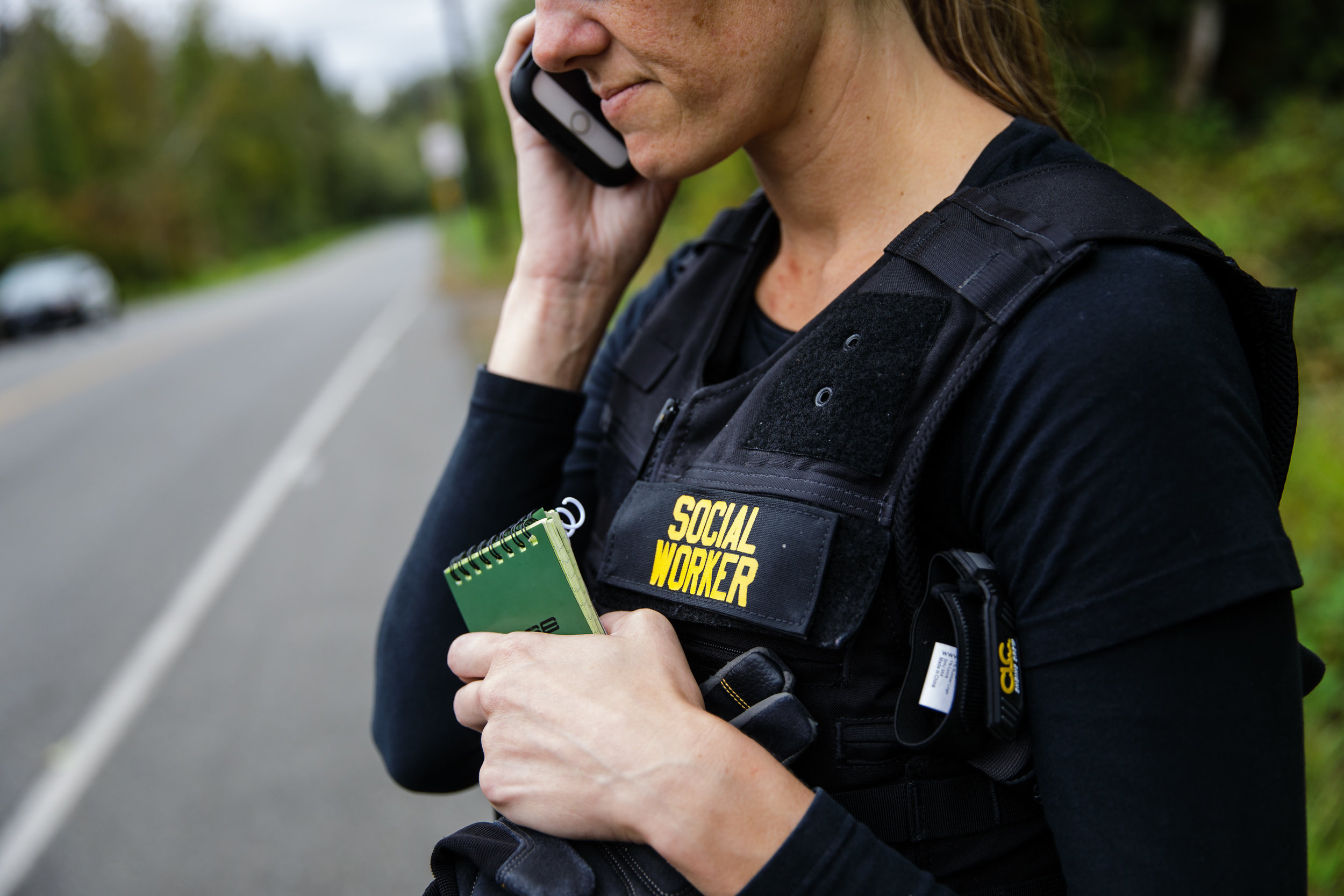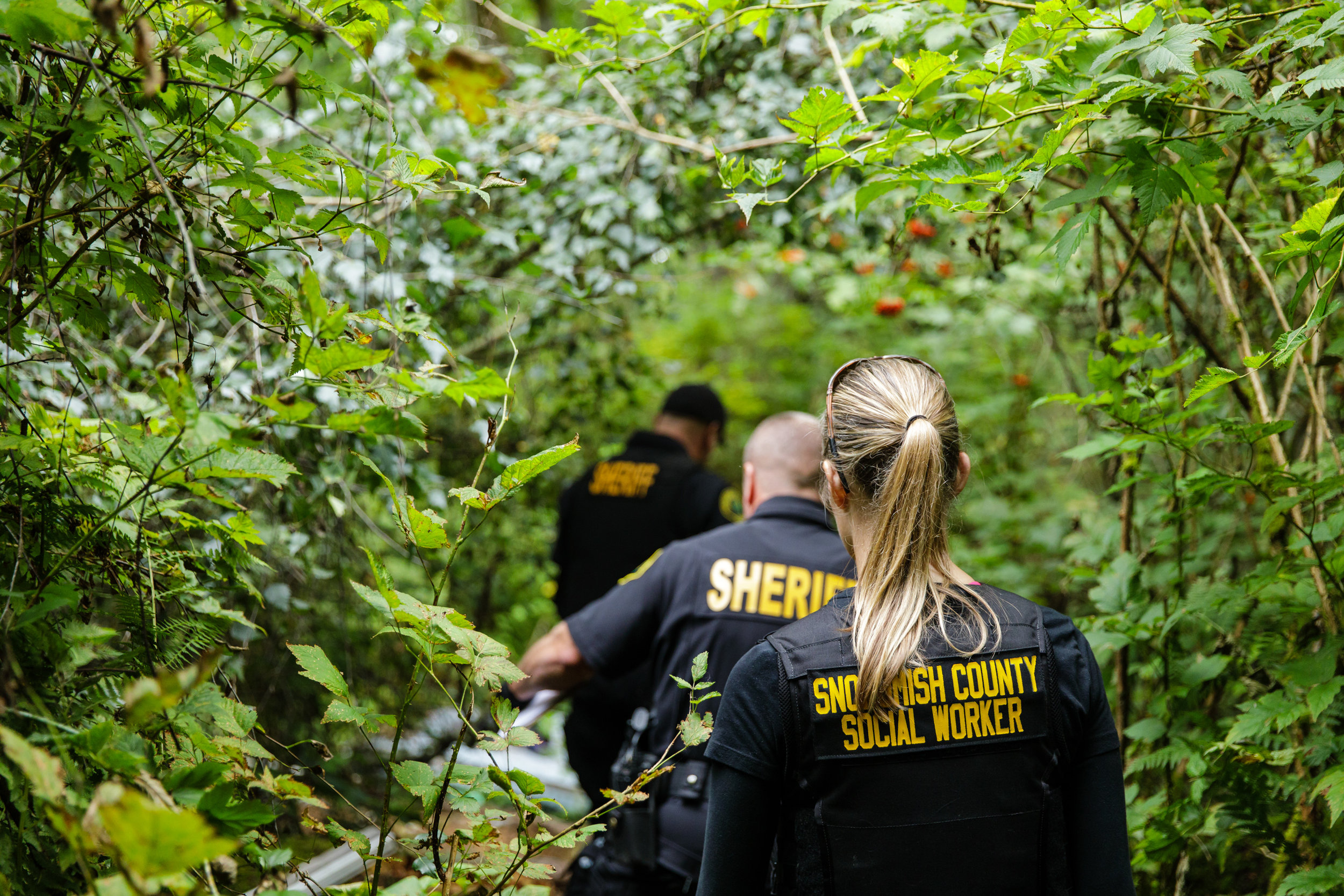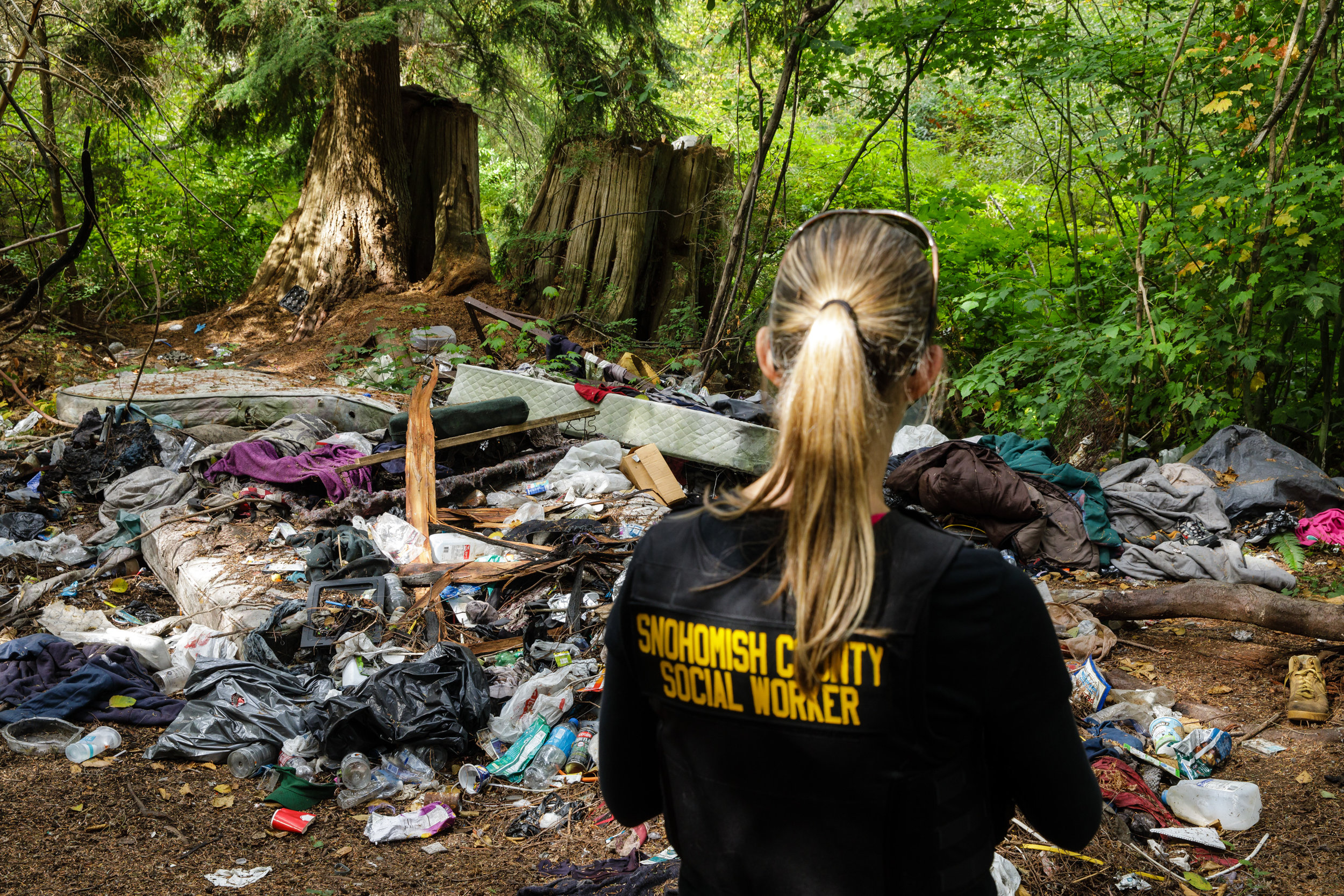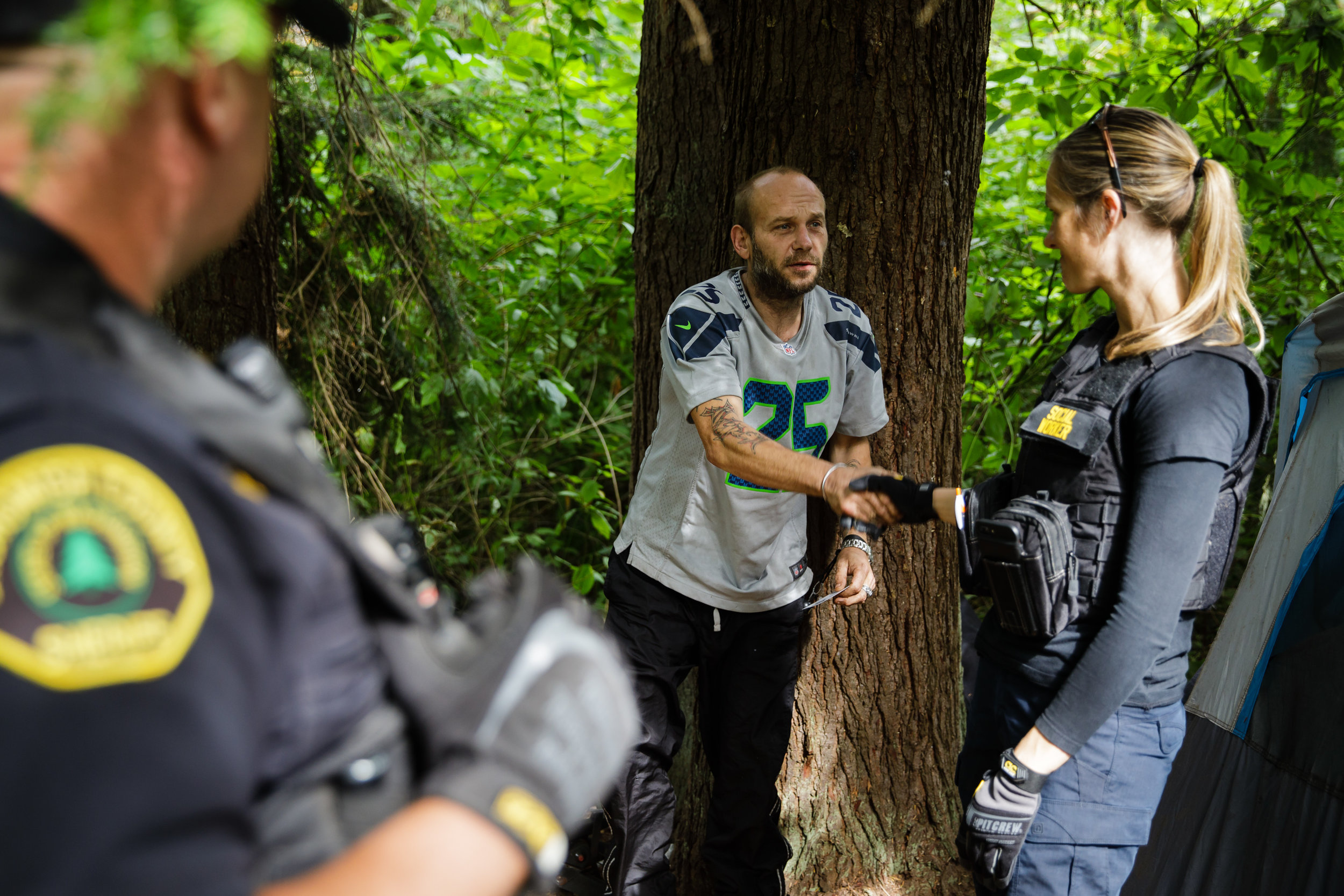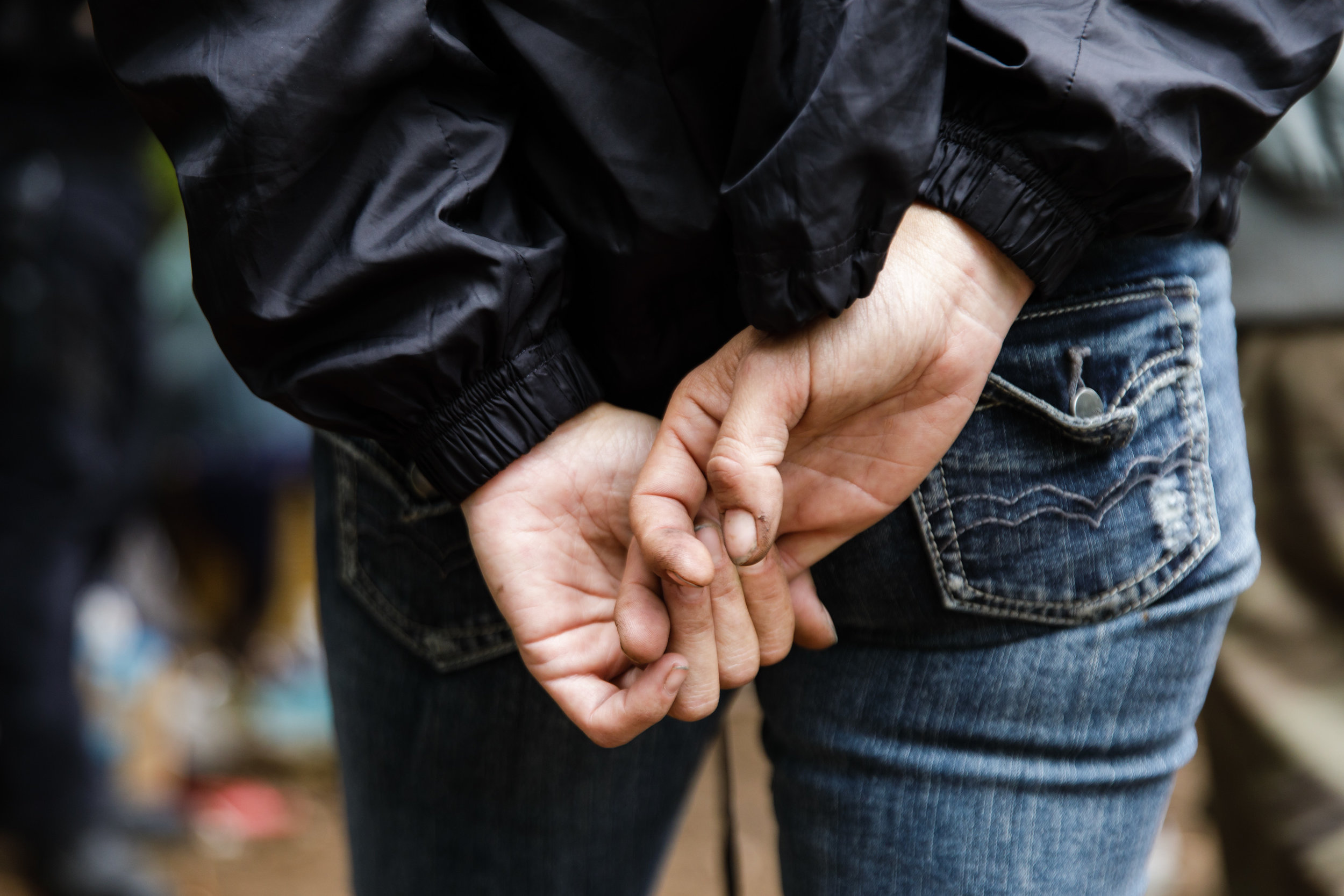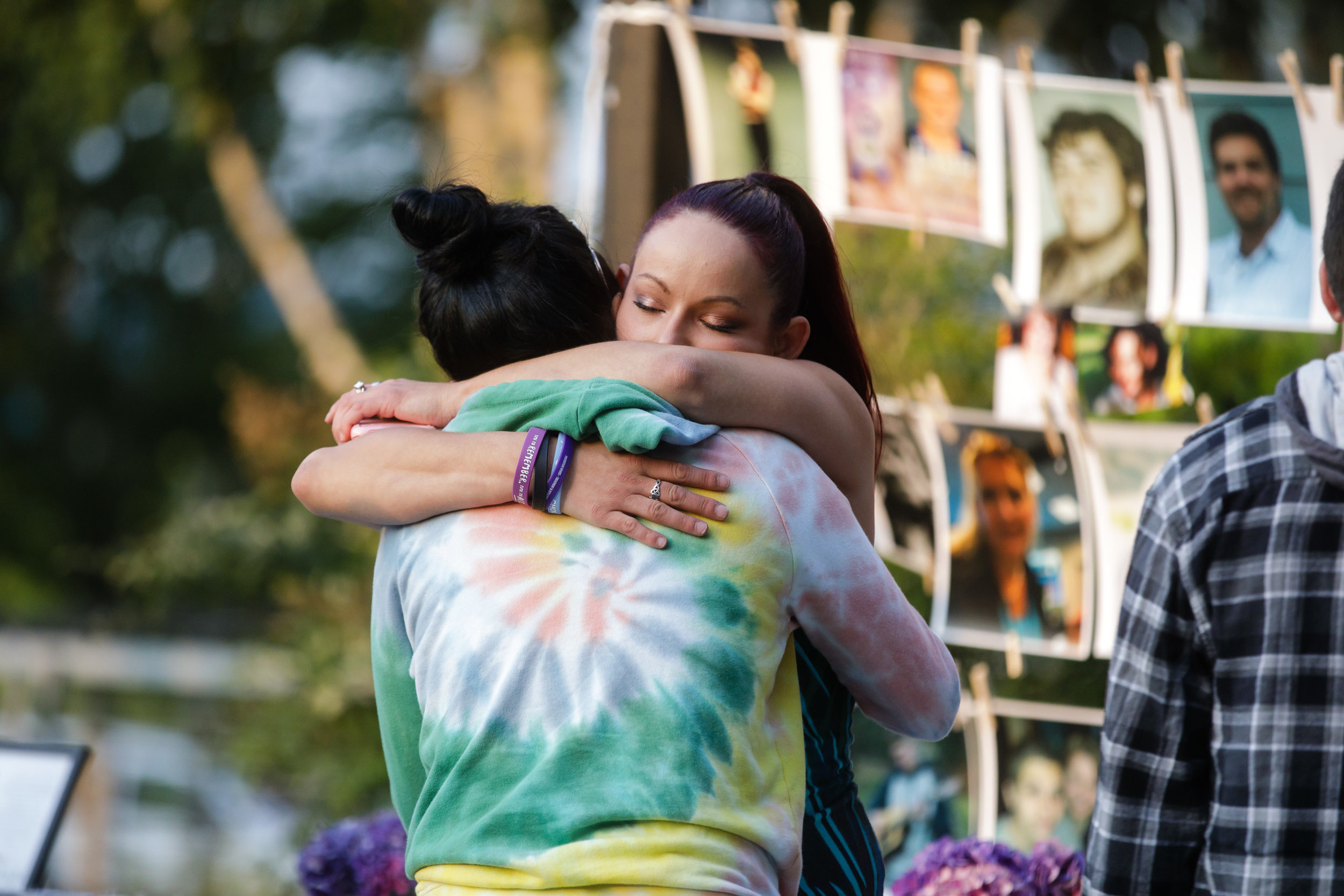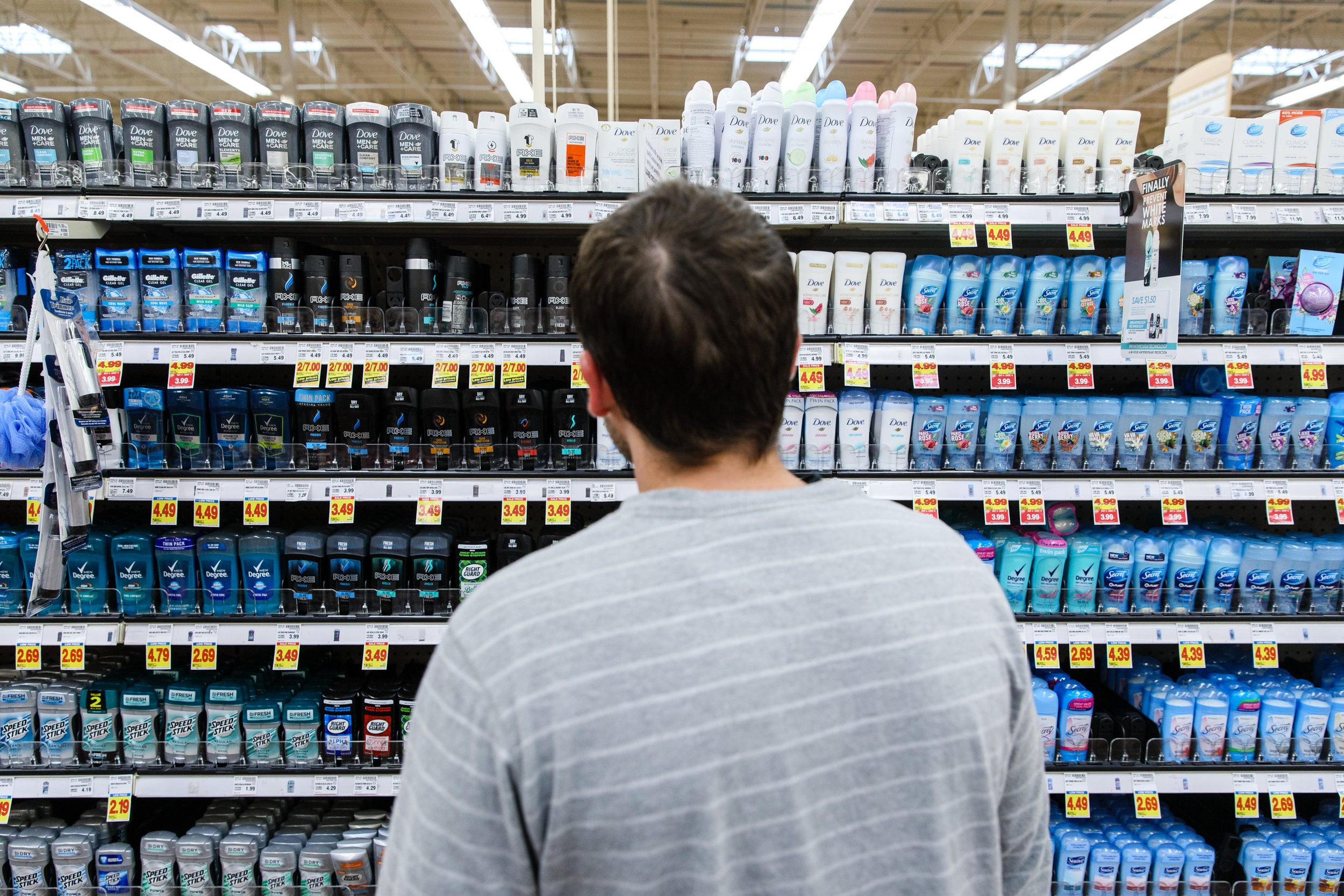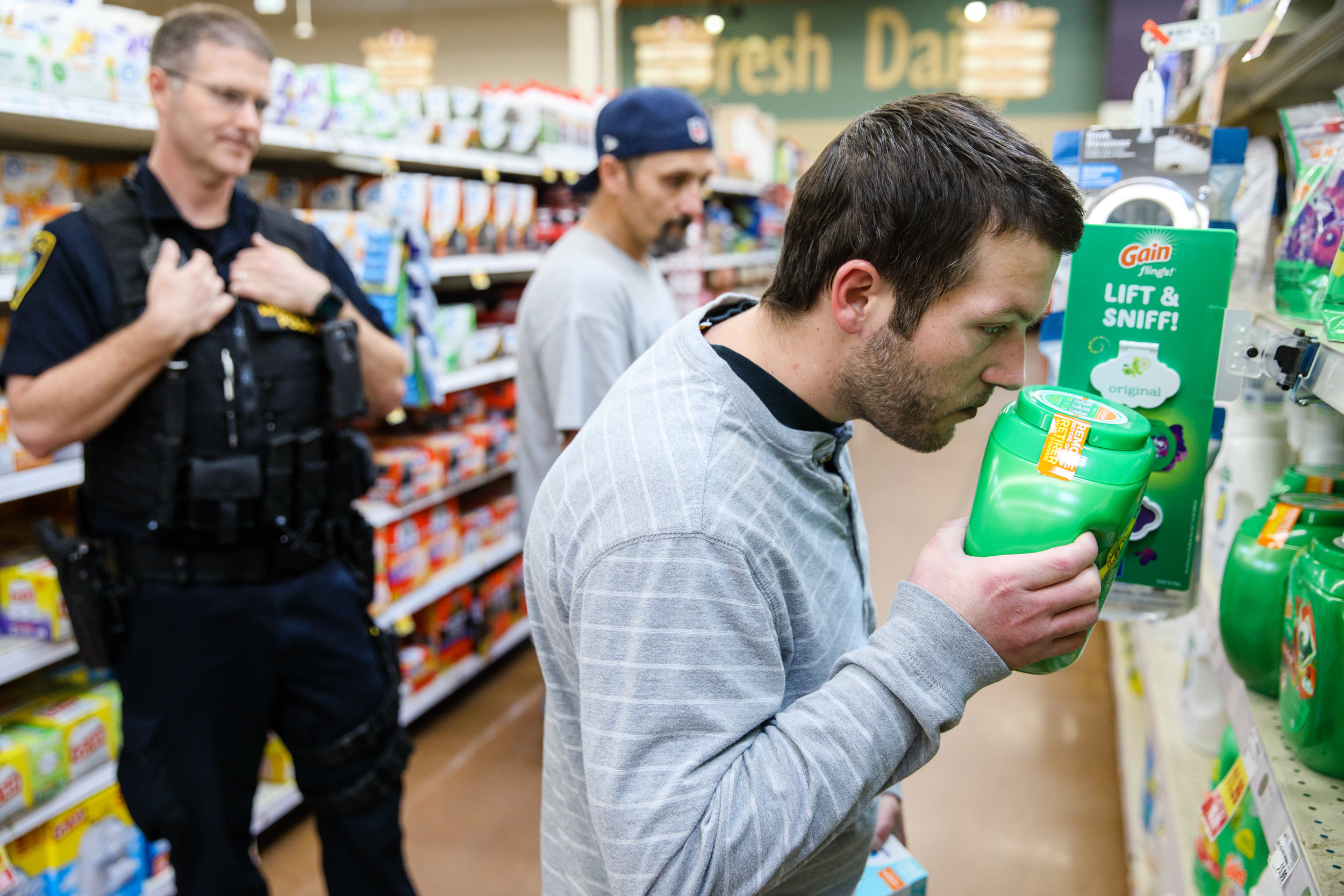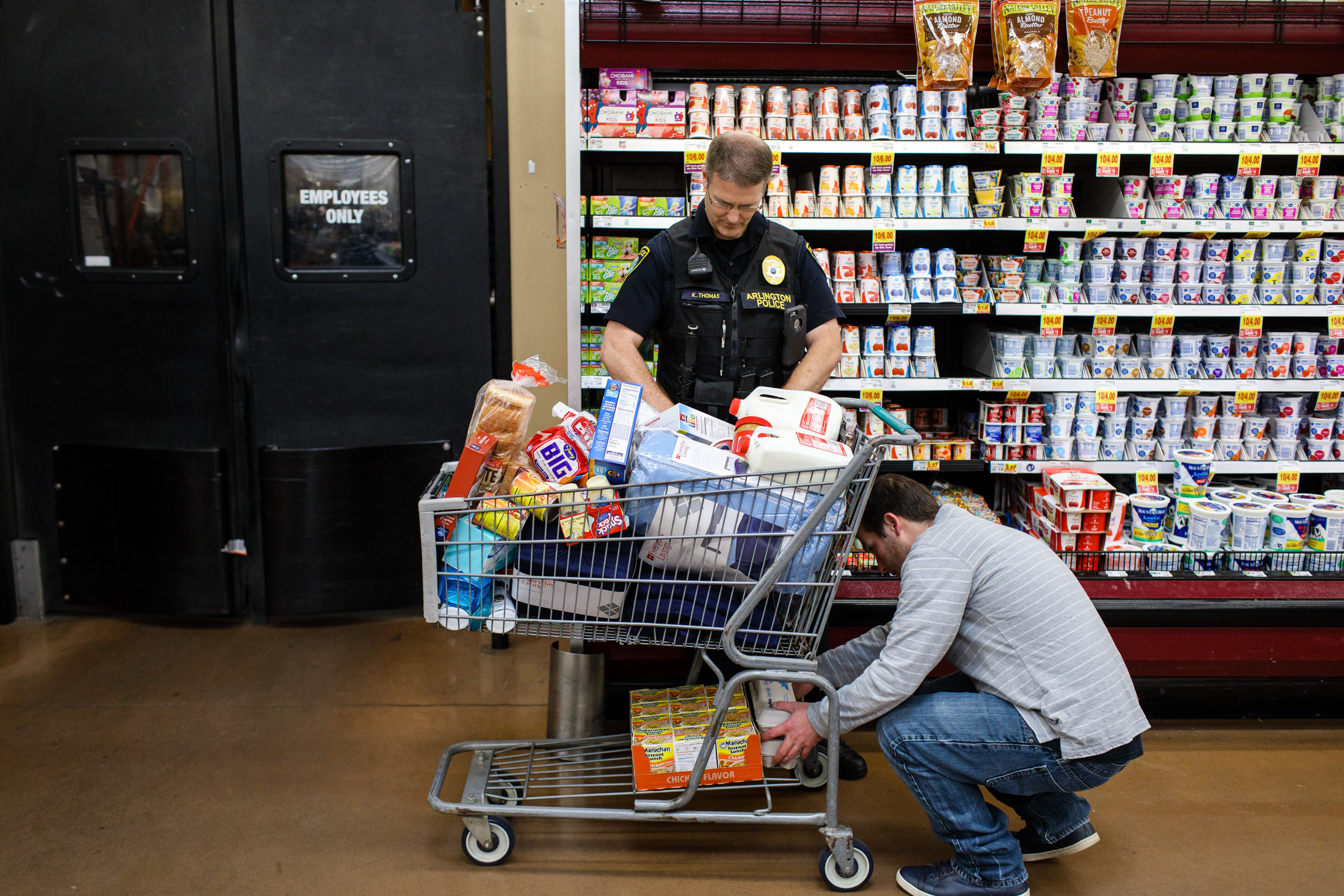reimagine police work to break the crime cycle
Season 1 EPisode 4: Professional hand-holders
SOLUTION:
Make teams of social workers and police officers who help homeless people with addiction get drug treatment and housing. Break the cycle of drug use, crime, and jail time by reaching out to people on the streets and in the woods, and asking them what help they need.
STORY:
Marshmallows in Kevlar and a foul-mouthed social worker. Coffee dates, mac n’ cheese, and body wash. The county reimagines police work and helps hundreds of people get into detox, drug treatment, and stable housing.
This season we’re in Snohomish County, Washington which has an oversized share of overdose deaths in the state and is now treating the opioid epidemic like a natural disaster.
LINKS TO MORE INFORMATION AND RESOURCES:
Snohomish County overdose and addiction treatment resource guide.
TRANSCRIPT
TRANSCRIPT OF FINDING FIXES: EPISODE 4
(Click the play button at the top of this page to listen)
Kyle Norris: Lauren Rainbow talks tough, swears often, and wears a bulletproof vest. Not your average social worker.
She’s on her phone a lot.
Lauren Rainbow: He’s been doing… Oop, here we go. Hold on. This is Lauren.
Norris: Lauren works for Snohomish County in Washington.
Rainbow: Hey Sam. I know, I heard. Dude you almost, you were almost at a year. I know man, you’re not walking into a lecture. It’s all good. I was chatting...
Norris: The person is on the phone calling to let Lauren know he’s relapsed after not using drugs for a whole year.
Rainbow: You’ve been kicking ass and it sounds like you are wanting to get back into treatment and let's make this a stumble, not a fall down the grand canyon.
Norris: Lauren is answering this call from the passenger seat of a police car. Her co-worker, who is driving, motions for her to hand him the phone.
Rainbow: Hold on. Hold on. Deputy McCurry wants to talk to you, hold on.
(To Bud McCurry) He relapsed, so be nice.
Bud McCurry: Sam. Sam. Sam. What’re you doing man?
Rainbow: Be nice!
McCurry: I heard. Are you ok? Yeah. Yeah. Alright. Are we gonna fix it? Ok, well let’s fix it.
Lauren Rainbow taking a phone call in the front seat of a police car.
CREDIT: LEAH NASH FOR FINDING FIXES »
Norris: All day long, this social worker and a cop drive around the county, helping people struggling with addiction and homelessness figure things out.
You’re listening to Finding Fixes. A podcast about solutions to the opioid epidemic. I’m Kyle Norris.
Anna Boiko-Weyrauch: And I’m Anna Boiko-Weyrauch.
Today we look at a program that Snohomish Country created a few years ago to help a specific population—those struggling with homelessness and addiction. The answer they came up with was to embed social workers in the police force. Together they’d bring services to people out in the field.
And this program has helped hundreds of people get into detox and treatment for addiction and find housing. Kyle’s going to take over this episode and tell us more.
Norris: Lauren and Bud finish their phone call with Sam.
It’s a rainy day. And their cop car rolls into the driveway of a big house in a nice neighborhood. It’s in Marysville, Washington. It’s a clean and sober residence. And they’ve come here to pick up another client named Brittany Sullivan.
Brittany Sullivan: Hello.
McCurry: Well hi, how are ya?
Sullivan: I’m Ok.
McCurry: How’s things going?
Sullivan: I’m fine.
McCurry: Yeah? What do you think of the house?
Sullivan: I like it.
Norris: When Bud and Lauren met Brittany she was living in the woods with a heroin addiction. Now she lives in sober housing. She just finishing a month-long detox program.
McCurry: Ok, I gotta ask you, I hope you remember, what’s up?
Sullivan: Um, I, Ok. I will no longer let my demons—Ok, hold on.
McCurry: It’s Ok.
Sullivan: I release my demons and open up my mind and heart into the journey of recovery. I will learn from my past and stay in the present. I am remembering destiny is not a matter of chance, it's a matter of choice. My name is Brittany and I'm thriving in my recovery today.
McCurry: Outstanding. Congratulations. Proud of you.
Norris: Today is a big deal for Brittany. She hasn’t used drugs for 38 days. The drugs got in the way of a lot of normal growing up.
Brittany: I haven’t adulted for a long time. Well, I don’t think I’ve ever adulted, honestly. But now I’m starting to adult and trying to figure it out. So I’m nervous. Nervous, nervous. This is my seventh time to treatment—sad but true. But this time it’s gonna work, for sure.
Norris: She’s also dealing with some serious medical issues. She says it’s all a lot to handle.
Brittany: Life without—not having to use, I mean, it’s exciting and stuff but it’s like, I just, I don’t know, I don’t know how to do that. But I got a lot of tools in treatment and we’re taught skills and I’m ready to step away from the bullshit I put myself through. And the stupid shit. Yeah, I’m over it.
Norris: Brittany and Bud meet up with Lauren, the social worker.
Sullivan: I’ve been trying to call.
Norris: They pile into the car with Bud and Lauren up front and Brittany in the back. Lauren talks to Brittany through a see-through window barrier. Lauren gives Brittany a heads-up.
Rainbow: So, this first day or two there’s gonna be a ton of information thrown at you.
Sullivan: I’ve already had so much thrown at me. I’m just like, oh my god, I don’t know what to do.
McCurry: You want a day planner?
Sullivan: Yeah, I definitely need one of those.
Norris: Lauren says they’re headed to buy Brittany some groceries and personal supplies like a toothbrush and shampoo.
Sullivan: And Lauren?
Rainbow: Yeah.
Sullivan: I have a warrant out in Marysville.
Rainbow: You have a warrant?
Sullivan: Yeah.
Rainbow: Ok, who’s your public defender?
Sullivan: I have no idea. Probably don’t have one.
Rainbow: Let’s find out.
Norris: You can’t quite hear it but Lauren says, without batting an eyelash, “Well, let’s go find out if you have a public defender.”
So, Lauren picks up the phone. Like we said, she’s on the phone a lot. She talks with clients and family members of clients. She’ll drop off donuts to people who might be able help clients. This program that teams up social workers with police officers is making a difference in people’s lives. So when Lauren calls lawyers and officials and judges, they’re willing to help.
Ok, just to recap here. Brittany is inside a cop car with an officer and social worker and she’s got a warrant out for her arrest. But she’s about to go shopping where three more police officers will show up. Not to arrest her. To celebrate her.
The opioid epidemic was bad in 2015. And County Sheriff, Ty Trenary, was feeling it.
Ty Trenary: We had people—we have people that are being arrested thirty or forty times in a seven year period, that are addicted to heroin and committing crimes to support their habit, and they're in and out of our jail, they're in and out of E.R. rooms, they're in and out of courtrooms, or they're needing services. When you look at how much we're spending on those people, sometimes half a million, a million dollars a person, each, I think you can say that the traditional method doesn't work.
Norris: The sheriff knew he had to try something different.
So they had a big meeting. With the county, law enforcement, human services, health officials. And they all brainstormed ideas.
That’s how they came up with the embedded social workers pilot program. Which is technically called The Office of Neighborhoods. Although I find that a bit clunky.
Social worker, Lauren Rainbow, says the basic idea is to visit people in need in the field and ask them what they want to accomplish. Then bring services to where they are or drive them to services. Here’s Lauren.
Rainbow: In the first few weeks, when we’re meeting a person, we’re figuring out who they are, why are they here, what’s been going on, what do they want? We never come in with agenda for people—that doesn’t work. They’ve seen that a million times over. And I think people are relieved when we ask them, “What are your goals? How can we help you get the life you want?”
Norris: Lauren says that the first thing that a lot of people need to do is get their ID.
Rainbow: Because their stuff gets stolen every single day. And you kind of need an ID to do almost everything. So we’ll take them up there, we’ll get their ID with them, make sure their medical insurance is up to date, we’ll grab some McDonalds, make sure they have their EBT card. And then we’ll start, you know, scheduling all these things so we can move forward. Obviously our clients don’t clients don’t have—most of them don’t have transportation. So we’ll go pick them up, and we’ll go grab lunch, we chit-chat, actually learn a lot about clients during those drives.
Norris: The long-term goal is to connect people with detox, and treatment, and six months of housing. But also deal with their legal issues because many of their clients have them. Then ultimately help clients figure out the next steps in their lives to living drug and crime free.
In the process of all this, the cops and social workers can become people’s support systems. Sometimes, their one and only support system.
Helping these individuals does a couple things. First, it means the county departments aren’t so overwhelmed.
Second, it potentially cuts down on crime.
In 2018, the Sheriff’s Office saw a twenty-percent drop in things like burglaries and car thefts. And those are crimes that people struggling with addictions often commit to get money to buy drugs.
Now it’s gonna take a while to analyze exactly why crime went down. But each person who gets addiction treatment and housing is one fewer person potentially committing crimes. Like Sam for example. Remember him? He was on the phone with Deputy Bud McCurry at the start of the episode.
The deputy told me Sam was once one of the most active burglars around. Once the team helped get him into treatment, he stopped committing crimes. So by helping one person, the workload for the police was immediately made lighter.
Meanwhile in the grocery store parking lot, three more cops have showed up. Because they know Brittany. One of the officers previously arrested her. And at the end of today’s shopping trip, that same officer is going to load her groceries into the trunk of a cop car.
They’re here to celebrate Brittany’s achievement. But Brittany is nervous. Because her previous experiences with police have been bad. She remembers the first time she met up with Lauren and another police officer at a cafe.
Sullivan: Usually I run from the police instead of going and sitting down and having coffee with them.
Norris: Brittany and her boyfriend went in to meet them.
Sullivan: They actually gave a fuck. And it's really like normally, the police that I've dealt with, none of them really care. They're just, you know, going to lock you away and they think that's helping the community. And it’s not. Like really, me and my boyfriend for instance we just needed help. You know? We just needed to get off streets and get clean. They gave us that chance and it’s pretty awesome. Huh, Lauren? That you gave us the chance to live.
Rainbow: Yeah. Yeah, you know, you guys.
Sullivan: You guys are intimidating over there.
Norris: Brittany points to the four police officers waiting for her in the grocery store in full uniform, with guns.
Rainbow: Really? Them?
Sullivan: Yeah.
Rainbow: No, they’re just a bunch of marshmallows in kevlar. They’re nothing.
Norris: Brittany hasn’t shopped in years.
Rainbow: Let’s just go down all the aisles. Any juice? Are you a breakfast juice kind of person? Alright.
Sullivan: I don’t know what I like, this is new, this is new to me.
Norris: She needs a lot of help just deciding what to buy.
Rainbow: You like tuna fish or no?
Sullivan: Nope.
Rainbow: Alright. What about mac n’ cheese?
Sullivan: Of course.
Rainbow: Everyone likes mac n’ cheese. Grab some of that.
Norris: They also hit the section with personal items.
Sullivan: Mac n’ cheese. Mac n’ cheese.
Rainbow: Grab a few more. So can you imagine, coming from homelessness—to let's go down this aisle get some deodorant all that stuff. You know, been living on the streets for a few years, you go to treatment where you're thrown into a rigorous schedule, you know, wake up at six thirty, breakfast, you know, communal chores, go to your first group counseling. Very different life, that uh—wait, body wash, you need body wash. There you go. Get a loofa.—And then after that we drop them in a house. Yay, now you have a house, and you have this schedule. Here’s all your appointments you need to meet. But they don’t have any bed sheets, they don’t have any food. They don’t have anything to take a shower with, no shampoo. No, no, that’s not part of reentry into the life that really has been the goal for so long.
Norris: Lauren says this is a fairly inexpensive piece of the puzzle. Some of the money for this program comes from a sales tax. Individual cities in the county also chip in. The money is used differently for each client. But it can be used for things like groceries and housing.
Lauren says that having some food and new personal items helps people feel good and feel ownership of their new spaces.
An Arlington police officer helping a man gather groceries and personal items at a Fred Meyer grocery store.
CREDIT: LEAH NASH FOR FINDING FIXES »
Commercial Announcement: Head over to the cleaning aisle and stock up on...
Norris: Lauren was around the corner making phone calls while Brittany was shopping. Now Lauren’s back and says Brittany you do have a warrant. For drug paraphernalia.
Rainbow: Yeah, so basically he was like, “Well, they want her to return to custody”—and I was like yeah.
Sullivan: What?!
Rainbow: So—no, just relax, hold on—so I said, “You know, we’re really starting to work with Marysville courts and so far they like us a lot.” My hope is that, let’s get a prosecutor who is a big fan of our program and the judge who also is a big fan. Let’s tell them what you’ve been doing, what you’re doing now and uh...
Norris: The courts want Brittany back in jail. Lauren is going to try and help Brittany stay out.
The idea is to help Brittany move on from her former life—living in the woods and using drugs. The way to do that is to help her ease into normal life, with mac and cheese and body wash. With supportive housing free of drugs. Not by sending her back to jail.
The Office of Neighborhoods team is small. It’s got seven police and five social workers. It’s located in the county’s new Diversion Center. That’s a place the county created for people like Brittany. Folks struggling with homeless and addiction and mental health issues can stay there for short-term housing, instead of staying in the woods. And while they’re there, they can get connected with services and long-term help.
This job requires the cops and social workers to their jobs in new and untraditional ways.
We met Bud, Lauren, and Sergeant Ian Huri in their old office to find out more about how the program works. The place was pretty small. On a bulletin board they kept track of their clients. And charted their client’s progress through detox, treatment, and housing. These co-workers like to joke with each other. Someone mentioned to my co-producer Anna that Bud was a Marine.
Boiko-Weyrauch: Are you a former Marine? Is that what you said?
McCurry: I am, yeah. Yeah. Sempre fi.
(Laughter)
Rainbow: Could you just tell that like by his physique? Or is it the—what really gave that away? I’m just curious.
Boiko-Weyrauch: Somebody said it.
(Laughter)
Norris: Bud has been in law enforcement for almost 20 years. He’s got a beefy build, bullet-proof vest, and is weighted down with weapons. Before he did this he worked in a high-intensity unit long hours and physically tough work. He says he likes this job with the Office of Neighborhoods better. Because it’s about building relationships and helping people.
He often says, at this job, he’s a professional hand-holder.
McCurry: A heroin addict in a camp needs to be shown the way. You literally have to hold their hand through this entire process.
Norris: He says this job is a lot like caring for a child.
McCurry: If I need to get my, my daughter to a doctor's appointment, what do I, as a parent, have to do? I have to go wake her up. Well we have to go wake our clients up, in their tent. I have to get my daughter cleaned up and ready to go. We need to make sure that our clients are able to go to this appointment. We get our clients food, coffee, whatever it is to get, kind of, their motor running. It’s that constant engagement, it’s building trust, kind of, we’re their cheerleader.
Boiko-Weyrauch: One thing I want to note. So you're talking about, you know, we’re professional hand holders and all that. From where I stand, you have two guns on you, pepper spray and a knife.
Ian Huri: That’s all you can see.
(Laughter)
Boiko-Weyrauch: You know, when you approach somebody, are they seeing a professional hand-holder or are they seeing your badge?
McCurry: They're not. When we first started down south here, we had people run from us in the camps and we would stand there and yell, “We're here to help.”
Norris: After they helped a few people in the camp, others saw that it worked and word spread—that these cops, they were okay.
It’s a drizzly and muddy day out in the woods behind Costco in Marysville, Washington. Two police officers and a social worker walk down a well-worn trail. They hop over a dirty mattress that someone laid down as a bridge across a creek. Pass trash piles of old food containers, needles, empty pill bottles and foil with burn marks used to smoke heroin.
Walking into homeless encampments and other places where people are squatting can be dangerous. And at the heart of this program, police are here to make sure that it’s safe for the social workers to do their jobs. Especially in potentially dangerous situations like this one.
The trio come to a fork in the trail and a cluster of tents. Sergeant Ian Huri says, “Watch where you step.”
Huri: One thing that you’re probably not picking up on the microphone is the odor. I don’t know if you guys smelled that when you walked over here.
Boiko-Weyrauch: What’s it smell like to you?
Huri: Urine. A lot of urine.
Buell: Do you guys mind if I step up on the—
Huri: We’re somewhere close to the bathroom so be just careful where you step.
Buell: We’re not running names and we’re not checking for warrants or anything like that. We just have to chat.
Norris: The folks in the tents are homeless and struggling with addiction. They’re breaking the law in all kinds of ways. By camping here, by using drugs, by having things on-hand like pipes and syringes.
The police are not here to arrest these people. They’re here to ask them out for coffee.
The second officer you heard in the background is Mike Buell with the Marysville Department. It’s a city in the north part of the county.
Mike has approached a tent with a few people inside, maybe three or four. The tent is on wooden pallets and he asks if it’s ok if he steps up onto the platform. Mike introduces himself to one man and says he’s not here to run any warrants or arrest anyone. Then another person’s head pops out of the tent.
Buell: Hey! So, how long have you guys been camped out here?
Norris: Mike hands out some business cards. He asks the people in the tent how long they’ve been camped out here. How long they’ve been homeless. And on a scale of 1-10 how bad do they want to get out?
One woman says she knows about this program and she’s already talked to someone.
Buell: Hi Crystal, I’m Mike.
Crystal: I’m guessing you heard a lot about me?
Buell: Well, you know, but that’s alright, we’re going to keep pestering ya. I’m gonna write my phone number down on another card. Anyone else need a card with my number?
Man: Yes sir.
Buell: Yeah, ok.
Man: I’ll take one too.
Buell: Absolutely.
Norris: A man in tent says he’s heard a lot of great things about the program. Mike asks Crystal if she’s scheduled her mental health assessment.
The answer is no. But she says it is something she’s thinking about.
Buell: Well, it shows you’re taking that step to—to want get better. And get in the program, right? Okay. I’m mean, that’s part of it. But like I already told you, we’re your transport—we’re basically your Uber. We’ll get you to and from your appointments, we’ll have meetings, feed you, get you meals, get you coffee. And get that stuff all taken care of so, anybody that’s on board, you can call that number. I’m old, I go bed pretty early, but my phone is always on so if I hear it go off I’ll text back.
Norris: Then social worker Elisa Delgado steps up and introduces herself to the folks in the tent and jumps into Mike’s conversation. She asks people what services they want. She listens. Then she tells them exactly where they’d need to go to get those services.
This next moment has always stuck with me. These people are deep into addiction and live in a tent. They’re pissing and shitting in the woods. Their clothes are dirty and their eyes are sunken in. They just look horrible. And I’m guessing their world is about survival and drugs. They don’t live in a world of calendars and planning things like coffee dates.
Social worker Lauren Rainbow and police reaching out to man who may be struggling with addiction.
CREDIT: LEAH NASH FOR FINDING FIXES »
Norris: Yet Mike asks them if they can meet on Monday. Like it’s the most normal thing in the world. He’s kinda cheery about it.
Buell: What’s better for you guys—morning or afternoons?
Man: Afternoon.
Buell: Afternoons?
Man: Yeah.
Buell: How about one o’clock at Starbucks?
Man: Sounds good.
Buell: And, I mean, one or all of ya? Amber, I’m pleading with you, go get that mental health assessment done.
Amber: Yeah, I gotta go.
Norris: You know, this is the biggest area that staff feel this program falls short in. And that’s dealing with people’s mental health issues. They say they can’t force anyone to get mental health help because it bumps up against the issue of civil liberties. And the county says it doesn’t have enough services to meet the high demand.
But back to who will show up on Monday.
Buell: Alright, guys. Zip her back up and stay dry! Crappy weather out here.
Norris: It’s a wild card. Everyone in the tent might show up or no one might show up. Either way, the officers and social workers will be back in a few days to check on them, and talk with them, and try and set up future coffee dates.
Not that long ago, 26-year-old Dillion Fulfer was living a life a lot like those people in the tent.
He was living out of his car with his family on the streets of Everett. Deep into an addiction to meth, heroin, and marijuana. He was getting arrested several times a month for things like trespassing.
He met Lauren and Bud when they approached him on the street and gave him their business cards. He thought they were approaching him to tell him he was in trouble.
Down the road, Dillion ended up getting arrested. He said to his attorney, “Tell Lauren Rainbow I’m here and I want to go to treatment.” She showed up the next day. Two days later she got Dillion shipped off to a treatment center in Spokane. Lauren and Bud have made a real difference. Dillion says:
Dillion Fulfer: When Bud says something, I’m all ears.
Norris: Since becoming their client, Dillion has changed the way he feels about social workers and police. He says Lauren and Bud are cool and caring.
Fulfer: When I went to my first drug evaluation, we were riding back from Evergreen recovery, he kind of told me—he was just like, “All right, picture this windshield like it's your life, OK? And people live to about eighty, so you cut that little part off, and you're twenty six”—I was twenty five at the time, I think—so he's like, “All right, you're right here. You still have this entire time to put your life back together.” And that has stuck with me. This whole time.
Norris: They also keep things pretty real. Especially Lauren, who teases him about his very long dreadlocks.
Fulfer: She always tries to heckle me about going to the barber, getting my hair cut. Every single time I talk to her she’s just like, “So did you make that barber appointment?” And if I like ask her to give me a ride somewhere, she’s like “Alright, well we need to make a stop by the barber.” And I just, I like, I like that, you know?
Norris: Why do you like that?
Fulfer: I don't know.
Rainbow: It’s part of the rapport building. It’s part of trust building. Dillion knows that, you know, we would never give him a hard time about his hair if we weren’t on a comfort level and knew he was on a comfort level with us and that there was a really strong trust to be able to kind of joke around with him like that. He and I have worked together to overcome some huge barriers in his progress, in his case. There’s been a few bumps in the road, you could say. And I know that I was the first person he called and knew that he could tell me exactly what was going on and there wouldn’t be a hint of shaming or disappointment. Anything other than, “I’m glad you told me, that’s practicing accountability and honesty, and I admire that. Let’s move forward. Let’s fix this, we got you.”
Norris: Bud and Lauren have gotten Dillion out of jail. They took him to treatment, found him sober housing, helped get his license. And then write a resume, apply for, interview, and eventually get a job. Working for the county in its new diversion center.
Dillion says he needed the opportunity to change.
These days he lives in a clean and sober house with other men in Everett. He wishes that Bud and Lauren would win some big award and be recognized for what they do.
Fulfer: They open doors for people and it just matters if you want to walk through it. Once they opened that door for me, I ran through it. I didn’t walk through it. I was tired of living that kind of life. And if it wasn’t for them, I’d still be out on the streets, in a tent.
Norris: When you combine social workers and police officers, a couple things can happen. For one thing, they open doors for each other. For example, a social worker who is accompanied by police can walk into an E.R. and quickly get to their client. Much quicker than if they were there by themselves.
Another thing is that the police have learned tricks and tips from the social workers. For example, there’s an expression Lauren says to clients, “Let’s make this a stumble, not a fall down the Grand Canyon.” That phrase is something the officers have started to say to their clients, as well. Lauren calls it her relapse line.
Rainbow: And I always know—as soon as the phone answers, it’s the tone, it’s that pause. I always know. And sometimes, even if they’re having a hard time getting it out, I’ll say, “Just go for it. Just tell me. It’s not going to be as bad as you think, I promise. I won’t yell, I won’t lecture. I promise. And, go!” And they’ll say, “Alright, so here’s what happened. I relapsed. Things haven’t been going well.” And so our stance is that, you know, we don’t get mad. We don’t say, You’re a failure. You let the program down.” Not at all. This part of working with people in recovery. There are going to be stumbles. There are going to be falls. I always tell people, “Let’s make this a stumble not a tumble down the Grand Canyon. In that, let’s get you back in detox and treatment now. We’ll start the whole thing over.”
Norris: She says clients relate to this approach because they know if they keep using, things will not end well.
Rainbow: Let’s not rack up a bunch of new felony charges, let’s not burn a million bridges. Let’s not go potentially overdose and die. Let’s not find you eight months later, in the camp, far worse off than when we first found you.
Norris: That non-judgmental response is what Office of Neighborhoods is all about. Several staff members said this approach also helps strip away the shame so many clients feel. Shame that can hold them back from making changes in their lives.
Snohomish County says their program is making an impact.
The county combines its numbers with numbers from the city of Everett’s embedded social worker program.
Here are the numbers from the first half of 2018.
Each month the teams had made contact with more than 100 people.
Of those people, 30 percent had completed the first step toward treatment—an evaluation of what kind of treatment they should get.
In the first part of 2018, the teams had gotten 125 people into stable housing. That’s 20 percent of everyone they reached out to.
80 people had completed treatment. That’s 12 percent of folks they reached out to.
And even though we’re talking numbers, remember these numbers are people. They are people who are no longer living in a tent in the woods behind Costco. No longer surrounded by their own filth and needles. And no longer potentially committing crimes to buy money to buy drugs.
Other police departments around the state have taken note and have reached out to learn more. A police captain from Eastern Washington recently came to shadow officers and social workers in the field.
If you ask the cops and the social workers about the best part of all this? They’d say it’s the text messages they get from their clients. On Thanksgiving and Christmas. From people who, when they met them, were addicted to heroin and living in tents. But are now sending thank you texts. That say, “Hey! I’m doing good. I’m with my family and it’s Thanksgiving. Thank you.”
Boiko-Weyrauch: And thank you so much for listening.
In the next episode of Finding Fixes, we’ll check back in with Hallie and Monty. They’re a couple in recovery for opioid addiction that we’re following.
Recently, we chatted with them in their car after an NA meeting.
Something was up. Their recovery just got even more important
Hallie Martin: And I was like, “Are you serious?” And they're like, “Yeah.” And I was like, “Are you joking?” And they're like, “Why would we joke about that?”
Boiko-Weyrauch: Hear that story and much more, in Episode 5.
Finding Fixes is a project of InvestigateWest, a nonprofit journalism organization working in the public interest.
Our team includes Anna Boiko-Weyrauch, Kyle Norris, and Julia Drachman with help from Paul Kiefer. Alisa Barba is our editor.
Joan Caine is our fairy godmother. Music by Jake Weholt and Josh Woodward. Photography by Leah Nash.
Find us on social media and online at Findingfixes.com
Leave us a review on iTunes. If it’s a nice review.
Norris: And hey, one more big thank you to everyone we met and everyone we talked to for this project. Especially people struggling with addiction and their family members. And a big thank you to everyone of Snohomish County.
